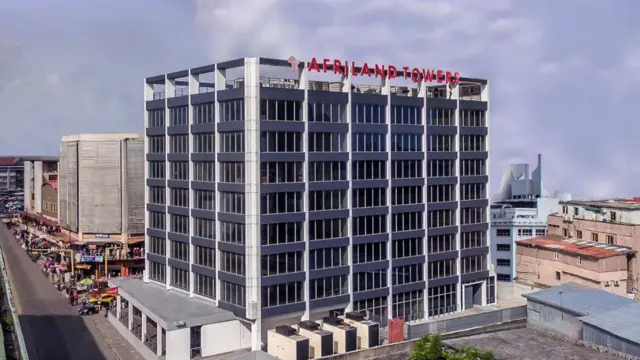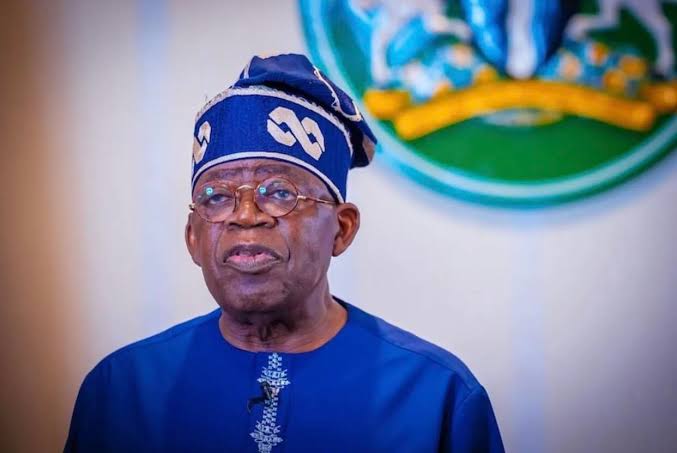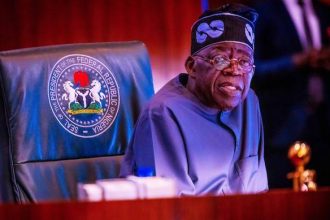A tragic fire outbreak that engulfed Afriland Towers on Broad Street, Lagos Island, on Tuesday has continued to reverberate across Nigeria’s business and political circles. The incident, which affected several key financial institutions, drew an outpouring of grief and solidarity, led by President Bola Ahmed Tinubu, who expressed deep condolences to the families of victims, the Federal Inland Revenue Service (FIRS), United Capital, United Bank of Africa (UBA) Plc, and Afriland Properties Limited, the owners of the building.
A Towering Landmark Turned Scene of Tragedy
Afriland Towers, a modern office and commercial complex situated in the heart of Lagos Island’s financial district, is home to several high-profile businesses, including Afriland Properties Limited, UBA Plc, FIRS offices, and United Capital. The building has long symbolized corporate resilience in Lagos’ ever-busy commercial hub, where thousands of workers converge daily.
The fire, which reportedly began on one of the upper floors, quickly spread through adjoining sections, triggering chaos as workers scrambled to safety. Although firefighters and first responders arrived on the scene within minutes, the intensity of the blaze led to fatalities and multiple injuries, while extensive damage was inflicted on offices, equipment, and records.
Witnesses recounted harrowing scenes of people rushing down staircases, some choking on thick smoke, while others helped the injured out of the building. The Lagos State Fire Service later confirmed that it had deployed several firefighting units to contain the blaze, supported by the Federal Fire Service and volunteer responders.
Presidential Condolences and National Mourning
President Tinubu, in his message, underscored the national importance of the incident. He described the Afriland Towers fire as not only a tragedy for the affected families and institutions but also for Nigeria’s corporate ecosystem.
“The President condoles with the management and staff of Afriland Properties Limited, the FIRS, United Capital, and UBA. He extends his deepest sympathies to the bereaved families and prays for the repose of the souls of the departed, as well as the quick recovery of the injured,” the Presidency’s statement read.
Tinubu went further to commend the courage of first responders. “He calls for more caution, training, and vigilance to forestall emergencies of this nature,” the statement added, pointing to the need for a renewed national focus on safety protocols in public and private infrastructure.

Corporate and Institutional Impact
The fire has raised questions about the vulnerability of Nigeria’s corporate institutions to emergencies. Afriland Towers, being home to critical organizations like the FIRS, UBA, and United Capital, has been central to daily business operations, financial transactions, and revenue administration.
Federal Inland Revenue Service (FIRS): Officials confirmed that some departments suffered losses of sensitive documents, though the agency reassured Nigerians that digital backups had been secured. The FIRS is expected to temporarily relocate affected staff to another office while rehabilitation work is carried out.
United Bank for Africa (UBA): As one of Africa’s largest banks with a strong international presence, UBA moved swiftly to reassure customers that banking operations remained unaffected, thanks to digital redundancy systems.
United Capital: The financial services group acknowledged disruptions but emphasized that operations were quickly restored through remote work and backup systems.
Afriland Properties Limited: The real estate development company pledged a full-scale investigation and immediate steps to assess structural damages to the tower, while working with authorities on reconstruction.
Eyewitness Accounts
Eyewitnesses described the moments of panic with emotional detail.
“I was on the 9th floor when the alarm went off. At first, people thought it was a drill. But within minutes, smoke filled the corridors, and we knew it was real,” said a staff member of UBA who declined to be named.
“The fire service did their best, but the flames were too intense at some point. It was heartbreaking to see colleagues injured while trying to escape,” said another survivor working with the FIRS who spoke on the condition of anonymity.
Rescue teams later confirmed that several people were hospitalized with burns and smoke inhalation, while some families mourned the loss of loved ones.
Emergency Response: Commendations and Lessons
The Lagos State Emergency Management Agency (LASEMA), the Federal Fire Service, medical personnel, and volunteer first responders have been widely praised for their intervention. Reports confirmed that dozens of lives were saved due to the coordinated evacuation efforts.
President Tinubu specifically highlighted their courage and deep sense of responsibility. Medical personnel were also recognized for setting up quick-response stations near the scene to stabilize victims before hospital transfer.
However, experts note that the incident exposes systemic gaps in fire safety compliance, evacuation drills, and building maintenance protocols. Safety analysts have called for mandatory annual audits of all high-rise buildings in Lagos, with stricter penalties for non-compliance.
Broader Implications for Urban Safety in Nigeria
The Afriland Towers fire reignites debates about Nigeria’s preparedness for urban emergencies. Lagos, a megacity of over 20 million residents, faces mounting challenges of overcrowding, infrastructural strain, and limited enforcement of safety standards.
Several previous incidents including market fires at Balogun and Ochanja, as well as past high-rise infernos have revealed the urgent need for systemic reforms.
Experts argue that corporations and government institutions must invest in:
- Automated fire suppression systems in all commercial buildings.
- Regular fire drills and staff training to improve response time.
- Upgraded firefighting infrastructure, including high-rise ladders and modern trucks.
- Public awareness campaigns to foster vigilance at workplaces.
A Humanitarian and Economic Tragedy
Beyond the institutional impact, the human toll of the Afriland Towers fire is immeasurable. Families mourning their loved ones face not just emotional pain but also economic uncertainty. Several victims were primary breadwinners, leaving dependents vulnerable.
Civil society groups and humanitarian organizations have already begun mobilizing support for affected families. Calls for compensation and insurance settlements are also growing louder, with many demanding that corporate employers take responsibility for staff welfare.
On the economic front, analysts predict short-term disruptions in financial services, though most affected institutions have robust digital systems to cushion the blow. Still, the reputational damage and costs of reconstruction are expected to run into billions of naira.
Government and Public Reactions
The Lagos State Government pledged full cooperation with federal authorities to investigate the cause of the fire and prevent future occurrences. Governor Babajide Sanwo-Olu visited the scene and promised relief measures for victims.
Lawmakers in the National Assembly have also called for hearings on Nigeria’s fire safety regulations, urging stricter enforcement and legislative backing for higher safety standards in commercial buildings.
Meanwhile, ordinary Nigerians have taken to social media to express grief, solidarity, and outrage. The hashtag #AfrilandTowersFire trended on X (formerly Twitter), with users demanding accountability and better preparedness.
A Call for Vigilance
The Afriland Towers fire stands as a painful reminder of the fragility of human life and the importance of safety in urban environments. For President Tinubu, it underscores the government’s obligation to not only commiserate but to also act decisively in strengthening safety standards nationwide.
As investigations continue, stakeholders from corporate Nigeria to government agencies and civil society are expected to collaborate in ensuring that such a tragedy never occurs again.
Conclusion
The inferno at Afriland Towers marks one of the most devastating corporate fires in recent memory in Lagos. With lives lost, institutions disrupted, and property destroyed, it is both a humanitarian and economic tragedy. Yet, amid the sorrow, the quick response of first responders and the resilience of survivors offer a glimmer of hope.
President Tinubu’s condolences reflect the gravity of the moment, while his call for greater caution and preparedness sets the stage for reforms. For Nigeria, the lesson is clear: fire safety is not optional, it is an urgent national priority.
As the nation mourns, the hope is that out of the ashes of Afriland Towers will rise a renewed commitment to safety, vigilance, and the protection of human life.












